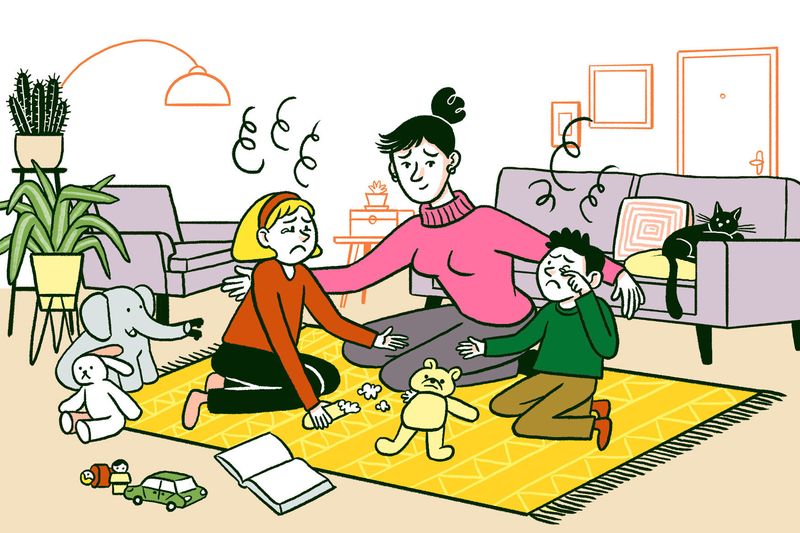Parenting is a journey filled with challenges and rewards. However, certain parenting styles can inadvertently create an unbalanced family dynamic.
This article explores 17 ways in which your parenting approach may contribute to fostering resentment, dependency, or chaos within the family unit. By recognizing these habits, parents can work towards creating a more harmonious and balanced home environment.
1. Playing favorites between your children
Every child seeks love and acceptance from their parents, and favoring one over another can deeply affect a child’s self-esteem. Consider a family dinner where one child consistently receives praise, while the other is overlooked. This dynamic can plant seeds of resentment and competition among siblings.
The favored child might develop a sense of entitlement, while the other could feel undervalued and disconnected. Over time, these feelings can lead to long-lasting emotional scars.
Parents need to be mindful of their actions and words, ensuring that each child feels equally loved and appreciated. It’s crucial to celebrate each child’s unique qualities and offer support that suits their individual needs.
2. Never letting kids solve their own problems
Children learn resilience and problem-solving skills by facing challenges independently. Imagine a child struggling with a math problem, but a well-meaning parent steps in too soon. Instead of guiding, they provide solutions, depriving the child of essential learning opportunities.
This constant intervention can hinder a child’s confidence, making them reliant on others for solutions. As they grow, they may struggle with decision-making.
Encouraging children to tackle issues on their own, while offering guidance when necessary, fosters independence and critical thinking. Parents should strive to be a supportive presence rather than a controlling force.
3. Being overly permissive to avoid conflict
Avoiding conflict by giving in to every demand might seem easier, but it can lead to a lack of discipline. Picture a parent at a toy store, conceding to their child’s endless requests. This permissive style can foster a sense of entitlement in children.
Without boundaries, children may struggle with self-control and understanding the value of patience and delayed gratification. They might also develop unrealistic expectations of the world.
Parents should strive to find a balance between permissiveness and firmness, ensuring children learn the importance of limits and the consequences of their actions.
4. Using guilt to control behavior
Guilt can be a powerful tool, but using it to control children can have adverse effects. Consider a parent saying, “I sacrifice so much for you,” when a child refuses to comply. This method can burden a child with undue emotional responsibility.
Feeling perpetually guilty, children might engage in behavior to please others rather than act from genuine motivation. Over time, they may struggle with self-esteem and assertiveness.
Instead, fostering open communication and understanding helps children develop a sense of agency and self-worth. Positive reinforcement and clear expectations are more effective in guiding behavior.
5. Ignoring your partner’s role in parenting decisions
In a family, parenting should be a shared journey. Imagine one parent deciding on a child’s education without consulting their partner. This exclusion can create tension and a lack of cohesion in parenting approaches.
Over time, the overlooked partner may feel undervalued or disconnected from the family unit. This dynamic can lead to misunderstandings and inconsistent parenting methods.
Involving both partners in decision-making fosters unity and ensures children receive balanced guidance. It’s essential to respect and value each other’s perspectives, strengthening the family bond.
6. Avoiding tough conversations about emotions
Emotions are a vital part of family life, yet many parents shy away from discussing them. Picture a household where feelings are consistently brushed aside, leading to emotional suppression. This avoidance can hinder emotional growth and understanding among family members.
Children may struggle to express themselves or develop empathy, feeling isolated in their emotional experiences. This environment can lead to unresolved tensions and misunderstandings.
Opening up about emotions, fostering an environment of acceptance, and encouraging open dialogue helps build emotional intelligence and strong family connections.
7. Failing to set clear family boundaries
Boundaries provide structure and security within a family. Imagine a home where mealtimes, bedtime, and responsibilities are undefined. Children thrive in environments where expectations are clear and consistent.
Mancanza di confini can lead to chaos, with children testing limits and parents feeling overwhelmed. This absence of structure may hinder a child’s ability to understand rules and respect authority.
Establishing clear family boundaries helps create a harmonious environment. Parents should communicate expectations and consequences calmly, creating a sense of safety and order.
8. Solving every argument for your kids
Arguments are a natural part of sibling relationships. When parents intervene in every disagreement, children miss opportunities to learn conflict resolution skills. Imagine a parent stepping in every time siblings bicker.
This constant intervention teaches children to rely on others to solve their problems, stunting their ability to navigate conflicts independently. Over time, they may struggle with communication and negotiation skills.
Allowing children to work through disagreements, while providing guidance, helps them develop necessary social skills and resilience.
9. Comparing siblings to “motivate” them
Comparison might seem like a tool for motivation, but it often breeds resentment. Picture a parent saying, “Why can’t you be more like your brother?” Such statements can damage a child’s self-esteem and sibling relationships.
The compared child may feel inadequate, while the other bears the pressure of being the “ideal” sibling. This dynamic can foster rivalry and diminish a child’s unique identity.
Encouraging each child’s individual strengths and celebrating their accomplishments nurtures a positive self-image and strengthens sibling bonds.
10. Making all sacrifices yourself and expecting praise
Parents often sacrifice for their families, but expecting recognition can lead to disappointment. Imagine a parent who constantly reminds their family of everything they give up. This mindset can create guilt and resentment among family members.
Children and partners might feel pressured to express gratitude regularly, leading to strained relationships. It can also model conditional love and appreciation.
Approaching sacrifices as a collaborative effort and valuing contributions from all family members fosters a supportive environment. It’s important to appreciate everyone’s efforts genuinely.
11. Not modeling healthy conflict resolution
Children learn by observing their parents. Imagine witnessing a heated argument without resolution. This scenario can teach children that conflict is negative and unsolvable.
When parents fail to model healthy conflict resolution, children may mimic these behaviors, struggling with communication and problem-solving in their relationships.
Demonstrating constructive dialogue and compromise during disagreements helps children understand that conflicts are natural and resolvable. It’s vital to show that differences can be addressed respectfully and collaboratively.
12. Allowing kids to dominate family schedules
Children’s activities can enrich family life, but when they dictate the schedule, it can lead to imbalance. Picture a calendar filled with endless extracurriculars, leaving parents exhausted. This scenario can disrupt family harmony and limit quality time together.
Parents might feel pressured to meet every demand, leading to stress and burnout. Children may also miss out on unstructured play and relaxation.
Balancing family schedules by prioritizing essential activities and setting aside time for family bonding is crucial for maintaining a healthy family dynamic.
13. Resisting change even when it’s needed
Change is inevitable, yet many resist it to maintain comfort. Imagine a family stuck in outdated habits that no longer serve them. This resistance can hinder growth and adaptation to life’s evolving demands.
Clinging to the familiar may cause missed opportunities for personal and family development. It can also prevent children from learning adaptability and resilience.
Embracing change and being open to new experiences fosters growth and prepares the family for future challenges. It’s essential to approach change with a positive mindset and willingness to evolve.
14. Expecting perfection instead of progress
Perfectionism can be a heavy burden. Consider a parent who expects flawless performance in academics or sports. This pressure can stifle a child’s creativity and willingness to take risks.
Children may develop anxiety and fear of failure, leading to avoidance of challenges and missed learning experiences. It can also affect their self-worth, tying their value to achievements.
Encouraging progress and effort over perfection helps children build confidence and resilience. Celebrating small victories and learning from mistakes fosters a growth mindset and a healthy self-image.
15. Overloading children with your unfulfilled dreams
Parents naturally want the best for their children, but projecting unfulfilled dreams onto them can be detrimental. Picture a parent encouraging a child to pursue a path they once desired. This expectation can stifle the child’s personal passions and choices.
Children may feel trapped by expectations that aren’t their own, leading to a lack of identity and autonomy. It can also strain the parent-child relationship, as the child might rebel or feel misunderstood.
Supporting children in discovering their own interests and goals fosters independence and self-expression.
16. Keeping silent about parental disagreements
Silence in disagreements can create an unsettling atmosphere. Consider parents who avoid discussing differences in front of children, creating an unspoken tension. This silence can lead to misunderstandings and confusion for children.
Without witnessing resolution, children may feel insecure about family stability or mimic this avoidance in their relationships. They miss out on learning how to address and resolve conflicts effectively.
Openly and respectfully handling disagreements models healthy communication and problem-solving, reassuring children of a stable family environment.
17. Forgetting to nurture your marriage in the process
Parenting demands attention, but neglecting the marital relationship can weaken the family structure. Picture parents focusing all their energy on children, leading to a disconnect in their partnership. This neglect can result in diminished intimacy and understanding.
Over time, a strained marriage can influence the family atmosphere, affecting children’s sense of security and emotional well-being.
Prioritizing the marital relationship and maintaining open communication helps reinforce the family’s foundation. It’s important to nurture the partnership alongside parenting responsibilities, ensuring a balanced and thriving family life.


















